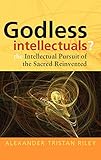Godless Intellectuals? : The Intellectual Pursuit of the Sacred Reinvented / Alexander Tristan Riley.
Material type: TextPublisher: New York ; Oxford : Berghahn Books, [2010]Copyright date: ©2010Description: 1 online resource (308 p.)Content type:
TextPublisher: New York ; Oxford : Berghahn Books, [2010]Copyright date: ©2010Description: 1 online resource (308 p.)Content type: - 9781845456702
- 9781845458263
- 301
- HM465 .R56 2010
- online - DeGruyter
| Item type | Current library | Call number | URL | Status | Notes | Barcode | |
|---|---|---|---|---|---|---|---|
 eBook
eBook
|
Biblioteca "Angelicum" Pont. Univ. S.Tommaso d'Aquino Nuvola online | online - DeGruyter (Browse shelf(Opens below)) | Online access | Not for loan (Accesso limitato) | Accesso per gli utenti autorizzati / Access for authorized users | (dgr)9781845458263 |
Frontmatter -- Contents -- Acknowledgements -- Chapter 1 The Intellectual Pursuit of the Sacred -- Chapter 2 Intellectual Production and Interpretation: The Intellectual Habitus -- Chapter 3 The Scene of Durkheimian Sociology: A View of the Parisian Intellectual Field at the Turn of the Nineteenth Century -- Chapter 4 Écoles, Masters, and The Dreyfus Affair: Institutions and Networks that Shaped the Durkheimians and the Political Affair that Positioned Them -- Chapter 5 The Scene of Poststructuralism: A View of the Parisian Intellectual Field from the End of WWII to the 1960s -- Chapter 6 Écoles, Masters, and May 1968: Institutions and Networks that Shaped the Poststructuralists, and the Political Affair that Positioned Them -- Chapter 7 Being a Durkheimian Intellectual -- Chapter 8 The Sacred in Durkheimian Thought I -- Chapter 9 The Sacred in Durkheimian Thought II: Ascetic and Mystic Durkheimianisms -- Chapter 10 The Line of Descent of the Mystics: The Collège de Sociologie and Critique as the Conduits to Poststructuralism -- Chapter 11 Being a Poststructuralist Intellectual -- Chapter 12 The Sacred in Poststructuralist Thought -- Chapter 13 Godless Intellectuals, Then? Or… Something Else? -- Bibliography -- Index
restricted access online access with authorization star
http://purl.org/coar/access_right/c_16ec
The Durkheimians have traditionally been understood as positivist, secular thinkers, fully within the Enlightenment project of limitless reason and progress. In a radical revision of this view, this book persuasively argues that the core members of the Durkheimian circle (Durkheim himself, Marcel Mauss, Henri Hubert and Robert Hertz) are significantly more complicated than this. Through his extensive analysis of large volumes of correspondence as well as historical and macro-sociological mappings of the intellectual and social worlds in which the Durkheimian project emerged, the author shows the Durkheimian project to have constituted a quasi-religious quest in ways much deeper than most interpreters have thought. Their fascination, both personal and intellectual, with the sacred is the basis on which the author reconstructs some important components of modern French intellectual history, connecting Durkheimian thought to key representatives of French poststructuralism and postmodernism: Bataille, Foucault, Derrida, Baudrillard, and Deleuze.
Mode of access: Internet via World Wide Web.
In English.
Description based on online resource; title from PDF title page (publisher's Web site, viewed 25. Jun 2024)


